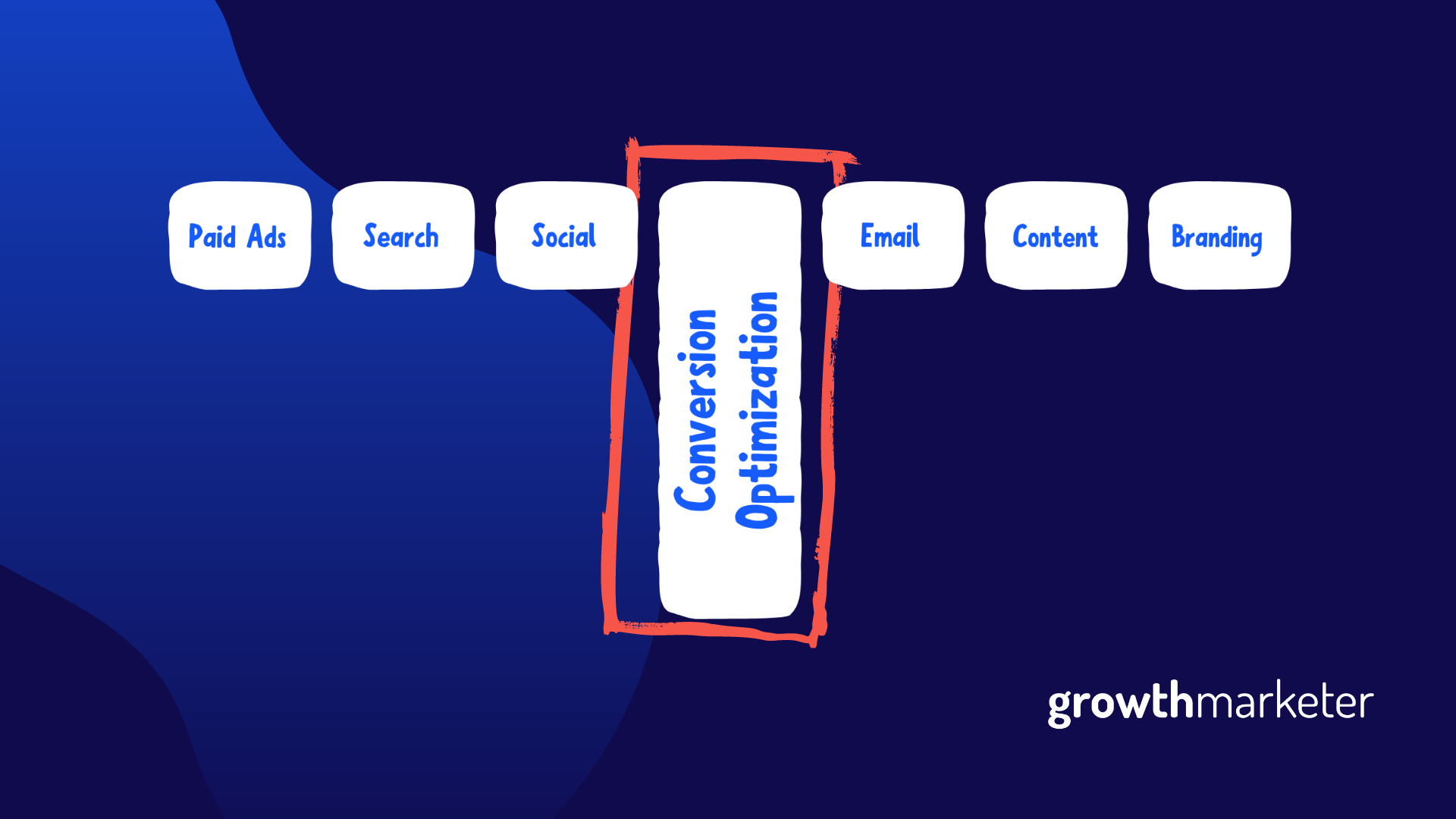So, you want to launch your growth marketing career, but aren’t sure where to start? In this article, I answer some of the most common questions about growth marketing as a profession and share specific tips you can use to take the next steps.
What does a growth marketer do?
A growth marketer is committed to understanding every element of a business’s marketing strategy and tactics to make data-driven tweaks that help improve a company’s key performance indicators or KPI’s. Key performance indicators are data points most often related to customer engagement, customer retention, customer acquisition, etc.
Growth marketers can make suggestions and updates by running systematic marketing tests for every variable in a specific marketing campaign. Such tests give business executives confidence in investing in a new marketing channel or making changes to a current one. Growth marketers are also called performance marketers, growth marketing managers, demand generation marketers, etc. A growth marketer’s job is to understand a user’s experience and improve upon this experience to drive better results.
Growth marketing is different from channel-specific marketing, such as email marketing, digital marketing, etc., because growth marketers focus on many channels and approaches at once. Growth marketers are often well-versed in email campaigns, paid ads, social media, etc., sometimes just from a strategic perspective, but often as the ones who will implement the campaigns as well. Together, they are focused on the big picture and use data-driven results to facilitate changes that meet or exceed the goals and objectives of the brand.
The importance of testing
Growth marketers must always provide data to support their marketing proposals. This data can sometimes come from analyzing past marketing metrics, but it typically comes from testing.
A/B testing
Growth marketers most commonly use A/B testing to determine what resonates with a company’s target audience. They do this by segmenting an audience into two groups. Group A gets one marketing piece such as an email, a piece of direct mail, a paid ad, etc., and Group B receives the same piece with one variable changed. The variable can be as simple as the color of a banner, the font used, or the image that is shown.
These variable changes, which may seem insignificant, often yield dramatically different results. The “winner” of these A/B tests gives insight into what resonates with an audience and helps a growth marketer update their marketing strategy. Growth marketers often conduct A/B tests sequentially, always testing a single variable to develop the best data-driven marketing strategy for a specific channel.
When conducting an A/B split test, growth marketers must always ensure only one variable differs between the groups so that the results are due to that change. The benefits of A/B testing include.
- Improved User Experience
- Reduce Bounce Rate
- Increase Conversion Rates
- Increased Sales
Usability testing
Usability testing is all about finding out what’s working with your products, services, or website, what’s not working, and how to make it all better.
Growth marketers frequently use usability testing to complement the quantitative data they get from more formal types of testing such as A/B tests. Think of each type of test going hand-in-hand with each other to help you see the bigger picture.
Whether you’re conducting a user interview, doing some functional testing of a landing page, or running a five second test, usability testing is a secret weapon of growth marketers everywhere.
The history of growth marketing
Growth marketing as a term has only been around for a little over a decade. The term “growth hacker” was coined by entrepreneur Sean Ellis in 2011 when he needed to fill a marketing position based solely on growing his user base as quickly as possible. He didn’t want a marketing specialist in a specific channel but a marketing generalist who could work across channels and marketing campaigns to drive results.
The term became popular due to its use in a blog post by Andrew Chen titled “Growth Hacking is the New VP Marketing.” In this article, Chen uses Airbnb and their implementation of the “Post to Craigslist” function to dramatically increase their user base as a case study of growth marketing. Chen argues that a traditional marketer specializing in a single marketing channel would have been unable to come up with and implement this integration idea as the project required technical skills that most marketers would not possess.
Today, growth hacking or growth marketing has developed into a global phenomenon and has dramatically impacted how company’s approach business. Companies rely on growth marketing to maximize overall results while keeping costs as low as possible.
How much do growth marketers make?
A growth marketer’s salary is determined by the company they work for, the value they add to the marketing team, and of course, the location where they are based.
According to Salary.com, the average salary for a growth market in 2021 is $84,659.
Salary.com gives a salary range from $67,928 to $99,054 for a growth marketing career.
How do you become a growth marketer?
Many growth marketers have a degree in business, marketing, or a related field, although this is not always the case. Past marketing experience is most important when deciding to pursue a growth marketing career.
However, before you decide to transition to this career path, you need to have a thorough understanding of growth marketing and how it is different from other forms of marketing. Consider reading books such as Hacking Growth by Sean Ellis, Growth Hacker Marketing by Ryan Holiday, and Traction: How Any Startup Can Achieve Explosive Customer Growth by Gabriel Weinberg.
Most individuals interested in a career in growth marketing are already in the marketing industry and find they want to develop and implement cross-channel marketing strategies rather than working within the confines of a single marketing channel. If you feel unfulfilled working on a single marketing channel and want to transition into growth marketing, take the following steps to launch your growth marketing career.
- Make it clear to your employer that you want to eventually move into a growth marketing position so they can help put you on the right track.
- Demonstrate to your employer that you are interested in moving into growth marketing by first suggesting and implementing testing within your channel that improves user experience and drives measurable results. You’ll want to do the following to start testing within your channel.
- Set a goal such as “increase click-through rates by X% on an email campaign.”
- Brainstorm ideas with your team. Communicating as a team leader and bringing everyone’s thoughts together is an essential skill for any growth marketer.
- Create a hypothesis like “changing the subject like from ___ to ___ will increase click-through rates by X%.
- Test your hypothesis. If you are new to testing, always start with A/B testing rather than multivariate.
- Measure the outcome
- Present the outcome to the higher-ups. Even if your hypothesis was wrong, the data still gives you an idea of what resonates with your target audience and can spark ideas for future tests.
- Rinse and repeat. Continue testing different variables until you start to move the needle significantly.
- Ask for additional training, and always be eager to learn and grow in your current position.
- Start working and coordinating with other marketing teams by implementing cross-functional marketing strategies.
- Stay patient and continue to advocate for yourself. It will take time to demonstrate that you are ready to move into a growth marketing position. However, if you document your data-driven results and present your growth and the changes you’ve implemented, you will have a better chance at convincing your employers that you are ready to take on such a position.
There are three basic skill sets that you will need to demonstrate to move into a growth marketing position:
Analytical capability — A company will want to know that you have experience developing a hypothesis, testing the hypothesis, analyzing the data, and coming to a conclusion. Start practicing your analytical skills within your own marketing channel.
Strategic thinking — A growth marketer has to have leadership skills to communicate across marketing channels. They need to be able to strategize and plan out future tests and share their marketing ideas in a way that excites executives.
Channel-specific expertise — This is the most challenging skill to acquire because it requires experience with different marketing channels such as paid ads, SEO, email marketing, etc.
Developing the skills necessary to get a position as a growth marketer takes time and a commitment to becoming an expert in different marketing channels. However, if you feel like you have adequately developed these skills and are currently interviewing for a growth marketing position, it’s smart to do your research before meeting with the interviewer and learn everything you can about the business and its different marketing channels.
Review the company’s current SEO strengths and weaknesses, sign up for their email list, and take detailed notes on their website to come into the interview with ideas on how you would improve these different channels. Make sure to find a balance between pointing out components you like and suggesting changes that drive results.
Launching your growth marketing career
In summary, growth marketing can be an excellent career path if you’re passionate about marketing, analytics, business, psychology, technology, and advertising.
There are tremendous opportunities for developing these skills on the job, and plenty of companies are looking to hire growth marketers today.





